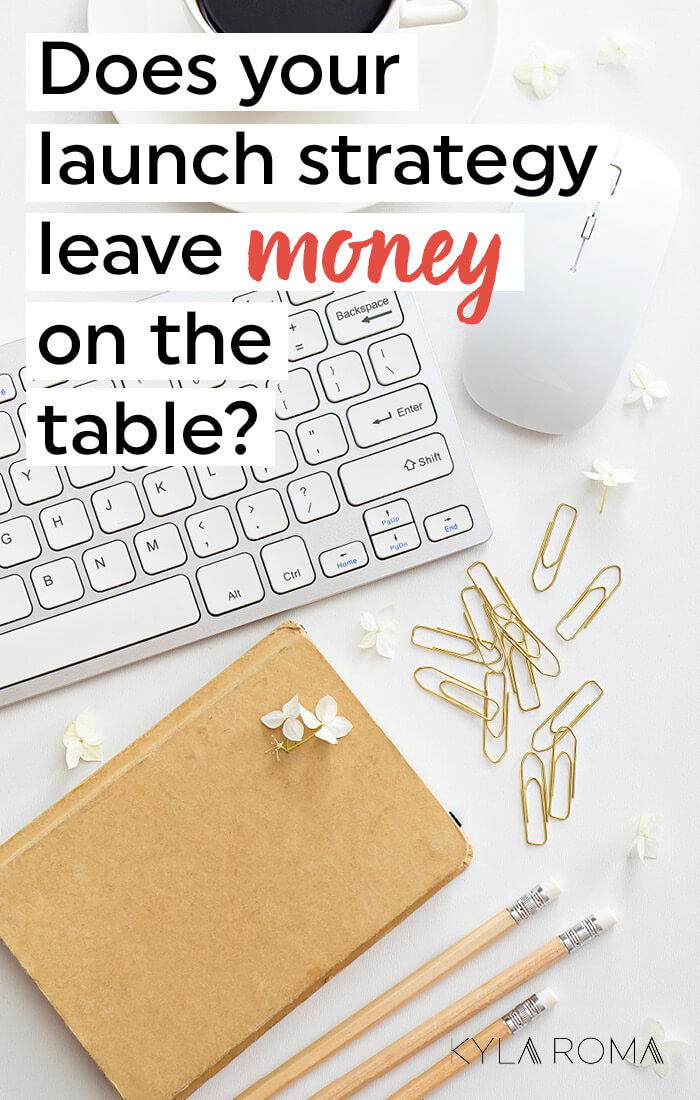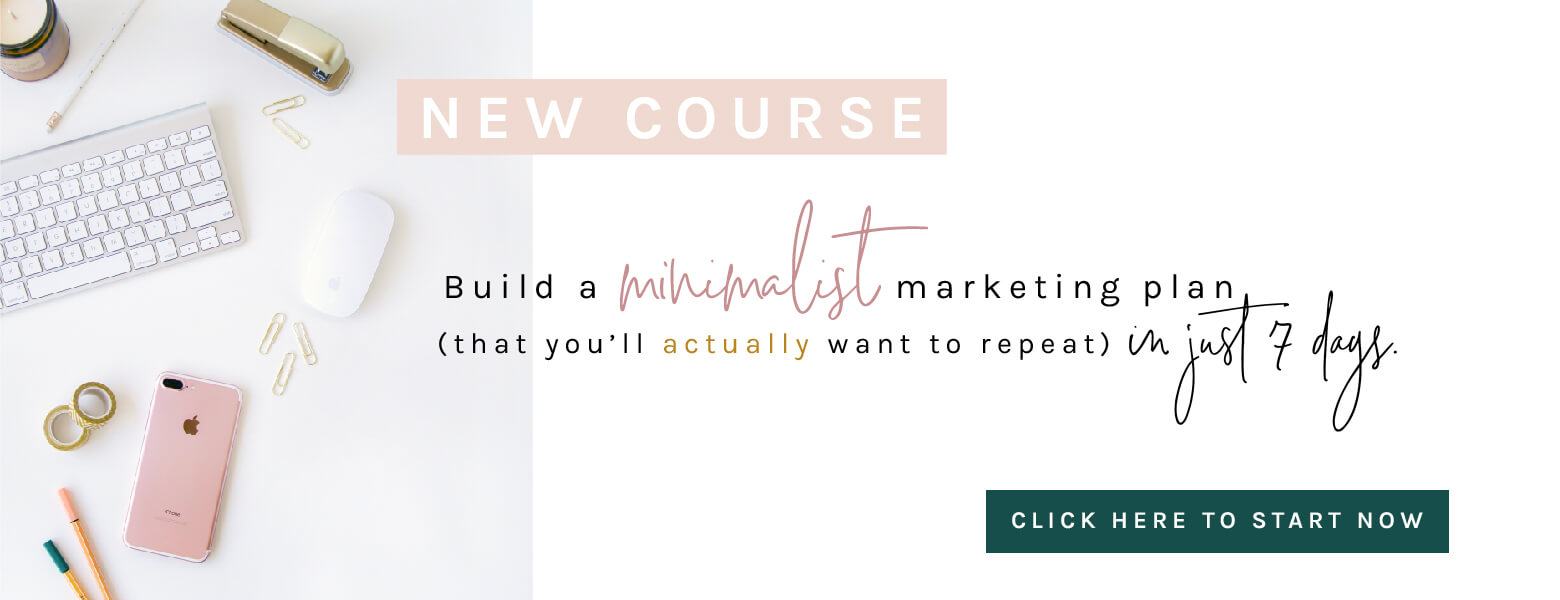When you think about selling or launching, do you think about:
- High anxiety launches and focused intensity, or
- Quiet mastery and day-to-day implementation
If it were up to me, you’d think about the second. Why? Because sales is a function of your business, not an event. It should be business as usual, the normal way you do things, an everyday part of your operations. But that’s not how we think about it or even talk about it.
This high stress, high stakes launch strategy leaves money on the table.
It’s why selling and our sales goals don’t feel sustainable or comfortable or predictable. This all or nothing approach to launch strategy is part of why launching is so emotional (though it doesn't have to be) and leaves us feeling drained when the cycle is finished.
It’s like the difference between making dinner night after night and hosting a huge dinner party for friends. The energy and investment are different, and so are the expectations. Dinner is sustainable. An endless series of dinner parties? Not so much.

So what’s the alternative for business owners who want revenue they can cheer about, plus sanity and down time?
Stop treating each launch or sales cycle as an event.
I'm just going to come out and say it: creating an elaborate launch experience from scratch time after time is truly the most expensive and draining way to sell anything.
Instead, identify the strategies and tactics that work best for your audience and systematize them:
- Map out conversations you will create with your marketing content.
- Decide in advance if you will advertise using social media and set a budget.
- Will you host a free workshop or use a free video series? Prepare it in advance.
- Create the email marketing series you’ll use and plan when you’ll publish it.
Just like your favorite recipes and standard pantry items, this type of preparation makes your sales efforts simple and sustainable. Creating marketing material in advance is like prepping food for several meals all at once… a great way to save time and cultivate peace!
Replace your launch strategy with a daily sales strategy.
I’m not talking about a sleazy, soul-sucking focus on hype. I’m talking about reassessing your launch strategy to see that nearly every conversation you have while operating your business is a sales conversation. Those customer service issues are really opportunities to add value and build a relationship. The people you meet in an online group or networking event or when interacting with a vendor are all potential customers who need what you sell.
Now don’t get me wrong: Creating a sales strategy for yourself and for your team doesn’t – and shouldn’t – mean that you pitch everyone you meet. (Friend, don't be that person.)
Instead, your new launch strategy is about focusing on providing value, building relationship, and sharing the mission of your organization.
Teach everyone on your team to listen carefully and identify relationship building moments in every client communication and to be on the lookout for where you or your team may self-sabotage sales.
Keep building relationships all through the launch.
Something typically happens when a business goes into “launch mode” and the cart opens. Relationship building efforts stop – and the focus shifts to sales, sales, sales. This is a HUGE mistake, and it’s one of the key ways you can leave money on the table.
Sure, sales are important. Don’t get me wrong here- I get that.
Here’s the thing: some people aren’t ready to buy. The timing isn’t right for them. They don’t understand the value. They are at a different place in their journey. Or they are NEW to your list, and they are still trying to figure out if they trust you and if they belong in your tribe. They need you to keep talking and building relationships with them, so they stick around and buy next time.
Be sure to create a path forward for people who aren’t ready to buy just yet. Give them a way to connect with you, engage further with your organization, and get settled in. Add relationship building material to your launch “menu” they way you’d put side dishes on the table to add nutritional value to a meal.
Share your message consistently and intentionally.
Here’s a little secret – you’re always inside a sales cycle.
Sometimes you are:
- Building brand awareness and increasing your audience.
- Sharing new ideas and gathering information.
- Teasing an upcoming promotional cycle to build excitement.
- Gathering feedback after a promotional campaign in order to dive deeper.
- Inviting people to work with you or consume a service you offer.
Each of these steps is part of the big picture of your sales cycle.
Not just the week when the cart is open, and the ads are running, and the emails are going out to your list. Each time you engage your audience you’re selling yourself, your message, and your organization
So share your message consistently. Create a story that combines your mission, values, and perspective and stick to it. The story shouldn’t change dramatically when the cart opens. If it does, you’re going to limit your effectiveness profoundly.
Instead, intentionally share your message in a way that aligns with where you are in the sales cycle, and where you’re going next.
An everyday sales strategy creates sustainable revenue – and successful launches.
There’s something comforting about the normal routine of a family dinner. While we might not know what’s being served when we come to the table, we can trust that we’ll leave happy and satisfied.
Moving from an event based launch strategy into a sales strategy creates that same kind of predictable rhythm for you, your team, and your audience. It builds confidence in your team by eliminating extra stress and emotion so sales can just be a normal part of day-to-day work.
Sustainable revenue comes when your audience knows you, trusts you, and knows what to expect from you. The consistency of an everyday sales strategy creates the ideal environment for your audience to buy – either now or later when the time is right.
Interested in moving beyond crazy to a sustainable, scalable sales system? Learn more about how our Simple Sales System Workshop can change your sales strategy and results in three days.
LAST UPDATED ON: September 5th, 2017
CATEGORY: Attract your ideal customer Content Marketing Strategy Conversion Optimization


